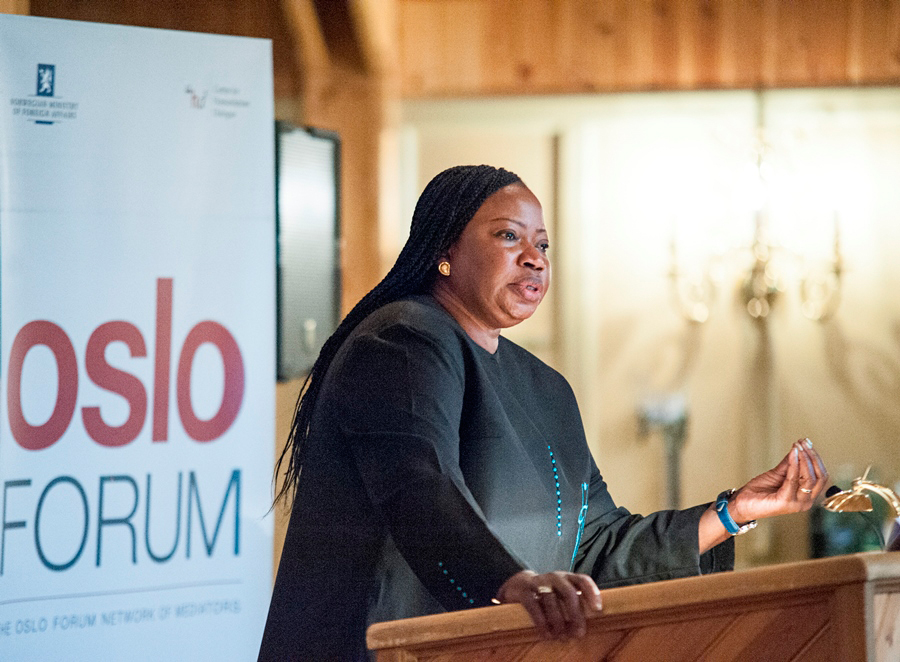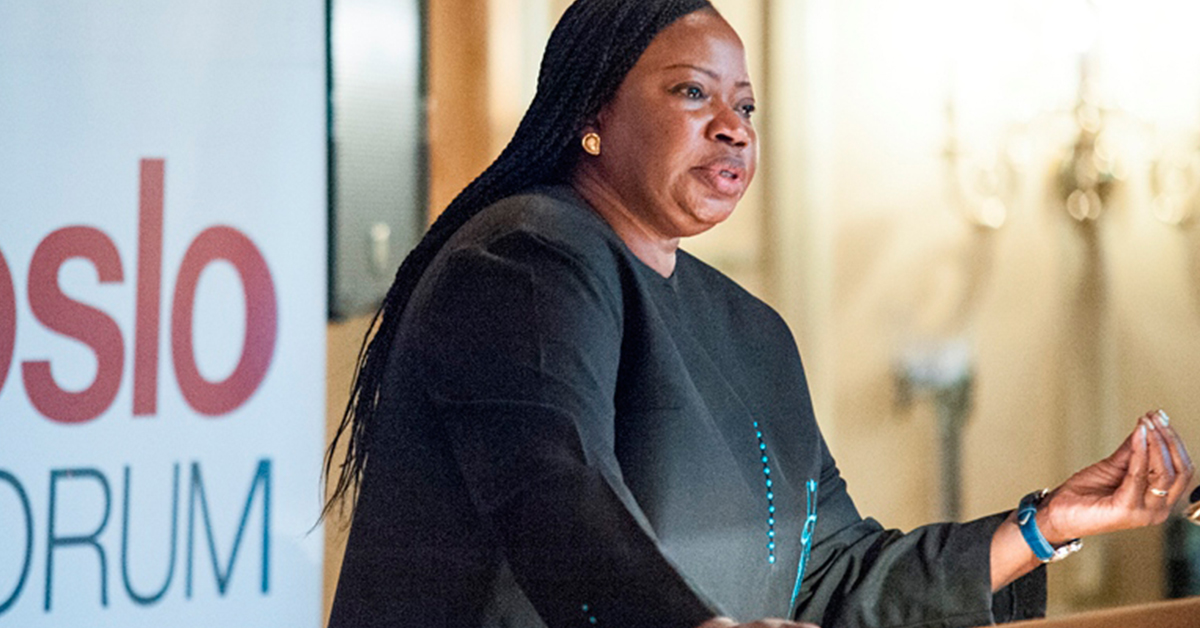
By Gbandi Benjamin DARE and Elisée Judicaël TIEHI
Elected by consensus on 12 December 2011 by the Assembly of States Parties, Fatou Bensouda will officially step down as Prosecutor of the International Criminal Court (ICC) on 15 June 2021. The first woman and first African (Gambian) to hold such a position, Fatou Bensouda will have tried, following her predecessor Luis Moreno-Ocampo, of whom she was the Deputy Prosecutor, to make her mark in the realization of the noble goal of the ICC, namely the fight against impunity, that of offering justice and reparation to the victims of international crimes (crimes against humanity, genocide, war crimes and the crime of aggression). Thus, she had set the tone, on the occasion of her swearing-in declaration of 15 June 2012, by stating that “(…) we should not be guided the words and propaganda of a few influential individuals whose sole aim is to evade justice – rather – we should focus on, and listen to the millions of victims who continue to suffer from massive crimes“. With the handover to the British Karim Khan just days away, at a pivotal moment when the ICC is clearly at a crossroads, what can we learn from Fatou Bensouda’s mandate? Clearly, if her tenure has been marked by notable failures, the fact remains that the functioning of the Office of the Prosecutor has undergone, under her responsibility, a remarkable qualitative leap.

A mandate certainly marked by notable failures…
Two major facts could sum up the failures of Fatou Bensouda’s tenure as head of the ICC’s Office of the Prosecutor. The first is the nature of the poor relationship between the ICC and Africa. Indeed, while her election was welcomed as an opportunity to revitalise relations between this jurisdiction and African countries, it has to be said that they have deteriorated significantly. Thus, following the international arrest warrant issued in 2009 against former Sudanese president Omar Al Bashir, the African Union adopted a resolution at the Addis Ababa Summit on 30 and 31 January 2017 calling for a collective withdrawal from the ICC. Although it was met with mixed reviews, it was relatively well received by some states, including South Africa.
The latter is further justified by the shortcomings of its criminal policy in the Bemba and Gbagbo/Blé cases, which led to their acquittal in June 2018 and April 2021 respectively. These two acquittals were a slap in the face for the Office of the Prosecutor, and a profound disappointment for the many victims in their quest for justice and reparation. However, these failures should not overshadow his remarkable initiatives to improve the functioning of the Office of the Prosecutor in order to strengthen the credibility of the ICC.
… But also characterised by remarkable initiatives
These “Bensouda years” have been marked by many beneficial actions for her Office and for international criminal justice. Fatou Bensouda has made significant contributions to improving the governance framework of the Office of the Prosecutor, compared to her predecessor Mr. Ocampo. Many documents attest to her efforts, such as the publication of policies and strategies to make the actions of her Office more predictable and transparent. For example, in the interest of victims and justice, in point 2 of the 2019-2021 strategic plan, the Office of the Prosecutor has chosen to increase the efficiency of preliminary examinations, investigations and prosecutions. Some successes, notably against Bosco Ntaganda, sentenced in 2019 to thirty years in prison for war crimes and crimes against humanity in the eastern DRC testify to the validity of this decision.
While Fatou Bensouda has investigated extensively in Africa (in CAR, Mali, Sudan and Libya), she has also made great efforts to provide more evidence towards an objective universalisation of the ICC. In December 2019, at the close of the preliminary investigation into the situation in Palestine, Fatou Bensouda announced that she had reached the conclusion that there was a reasonable basis to proceed with an investigation into the situation in Palestine under Article 53(1) of the Rome Statute. Recent events between Israelis and Palestinians, with an upsurge in violence that could result in war crimes, prove her right. On 5 March 2020, thanks to the work of its Bureau, the ICC Appeals Chamber unanimously decided to authorize the Prosecutor to open an investigation into alleged crimes within the ICC’s jurisdiction in relation to the situation in the Islamic Republic of Afghanistan. This had led to the displeasure of some of the powers involved in these cases, such as the Trump administration’s sanctions against her and some of her staff.
Conclusion
In light of the above, Fatou Bensouda’s record at the ICC appears mixed. The commendable actions undertaken to increase the effectiveness and credibility of the Court’s mission contrast with the feelings of frustration and disappointment of victims in the Bemba and Laurent Gbagbo cases. Nevertheless, we should be grateful to her for having, notwithstanding political pressure and diplomatic intimidation, not only assumed her role with courage and determination, but above all opened up, beyond the African continent, new horizons for prosecution and investigation in the fight against impunity for grave crimes which, according to paragraph 3 of the Rome Statute, ‘defy the imagination and deeply shock the human conscience’.

Elisée Judicaël TIEHI is a PhD student in public international law at the University of Angers (France). He was previously an intern at the Legal Advisory Section of the Office of the Prosecutor of the International Criminal Court, then a visiting professional at the Trust Fund for Victims.

Gbandi Benjamin DARE is a Ph.D student in public international law and lecturer at the Université du Québec à Montréal (UQAM) in Canada. He is a member of the Editorial Board of the International Criminal Law Blog (in French).
The African Journal of International and Comparative Law provides invaluable scholarly material on law from a pan-African point of view. The journal includes articles on both public and private international law, either in English or French, as well as recent developments relevant to the continent of Africa. Find out how to subscribe, or recommend to your library.






